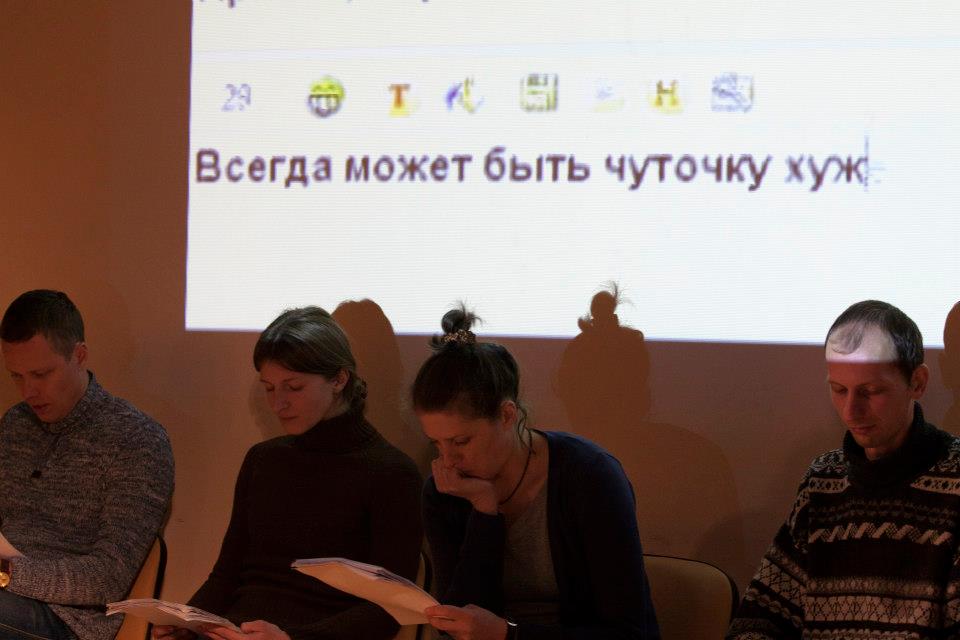Play by Pavel Pryazhko “The Pants”
The Belarusian playwright Pavel Pryazhko is one of the most performed and discussed young authors in Russia who influenced the development both contemporary Russian drama and a new stage language. Being loved in Russia Pryazhko is almost not demanded on his motherland.
Pavel Rudnev (authoritative Russian theatre critic) writes about Pryazhko: “The Belarusian Pavel Pryazhko causes either curse or adoration. Today, he is the most discussed contemporary playwright in Russia from the generation of 30-years-old playwrights. Moreover, his radicalism was demanded not only on the avant-garde stages, but also on very traditional dramatic stages of Russian province.
Pavel Pryazhko could change the course of modern plays in Russia. He turned the “new drama” from dramatic themes to dramatic language, to the debate around the building of modern plays. He made the text shape and the language of a play themes to discuss. Before Pryazhko “new drama” clung with plots, borderline states, travelling to the worlds unexplored by theatre yet… Pavel Pryazhko primarily puts formal experiments in dramatic writing: he, in fact, reverses the function of stage directions, he thinks about the qualities of the modern language, which is reduced to a narrow set of half-words, symbols, characters, he plays with the rhythm of the phrase, he deliberately uses the methods of construction primitivism speech. Pryazhko watches at paroxysms of modern language as a side, as assistant observer: how vocal apparatus of the modern teenager was distorted with the pop culture and the Internet consciousness, how language function is dying in the world without the need for a “live” communication, how words are meaningful and how the phrases are ultrashort in the non-literary, uncultured speech, how the changing language reflects a painful stiffness and stupefying materialized consciousness, without a metaphor in language and the need to colour, to play with words in it. ”
Pavel Rudnev about “The Pants ” by Pryazhko: “… In the “The Pants” Pryazhko starts working with the language of the characters making it deliberately primitive, turning the characters into the cardboard-like, representing so-called “a dull chorus of majority” which torments the heroine. In “The Pants” Pryazhko speaks about painful affection of modern man to material values, about the sense of beauty blended with manic need to have a thing, about the paranoid dream “to have” an advertised, branded product. The love to a thing, the desire to take it, to have it is a disease of the XX century. A feeling of peace and harmony, a sense of enjoyment and happiness for the modern human is connected with this painful passion, realized in material values, but still with the insatiable hunger of acquisition.
Intentionally distorted, reduced language makes characters of the play sketched characters, morality, and the main heroine is made like a folksy martyr half saint and half beatific who brings her beauty and her insatiable thirst of beauty on the sanctuary of the triumphant sense. Nina is a new Jeanne d’Arc, who was crucified by majority for her love to the things in which strangely expressed her need in beauty. “
On December 18 it was planned to perform the play to the viewer. But suddenly it occurred that we have to receive the permission of so-called art commission, which includes the functionaries “from culture” and representatives of the “official” culture of Brest. As a result the play was banned for showing in public.
The looking for an alternative place, where we could perform the play, was not succeeded. Despair has led us to a novel technological approach – if we talk about Belarus – to the Internet-theatre.
On February 28, 2013 at 20.00 we organized the webcast of the reading of the play “The Pants” written by Pavel Pryazhko. It was the first webcast in the history of Belarusian theatre.
Director: Aksana Haiko
Actors: Sviatlana Haidalionak
Siarhei Haiko
Aleh Harbatsuk
Elena Shtyk
Aksana Haiko
Aliaksandr Kazlyanka
Andrei Basiacki
Video: Siarhei Haiko
Music: Andrei Bahdanau
Off-screen text: Andrei Bahdanau
Media-moderator, director of the webcast: Andrei Aleksievich

